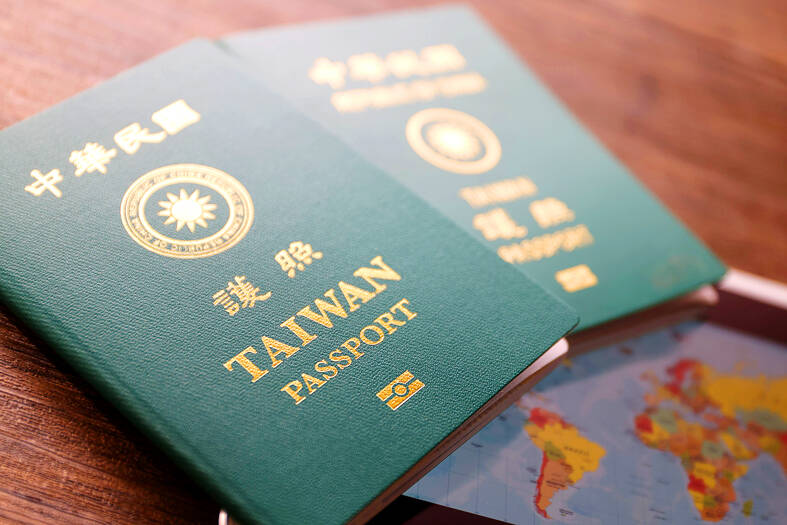A Taiwan passport enables its holder to enter 141 destinations visa-free, ranking 33rd among 199 countries and regions on this year’s Henley Passport Index.
Taiwan shared the same ranking as Peru, a slight improvement from 35th place last year, the index released yesterday by citizenship consultancy firm Henley & Partners showed.
Since the company started releasing annual rankings 19 years ago, Taiwan has climbed from 55th to 33rd place.

Photo: CNA
Taiwan’s ranking dropped to its lowest point, at 69th, in 2010, and reached its highest position, 24th, in 2014.
However, Taiwan’s position has stayed relatively steady at around 30th place since 2015, the report said.
Singapore rose from second to first place in this year’s rankings, with visa-free access to 195 destinations. The city-state has ranked first or second annually since 2018.
Following Singapore were France, Germany, Italy, Japan and Spain, tied in second place with visa-free access to 192 destinations each.
Austria, Finland, Ireland, Luxembourg, the Netherlands, South Korea and Sweden tied at third place, with 191 countries or regions not requiring holders to apply for visas in advance.
Next up were Belgium, Denmark, New Zealand, Norway, Switzerland and the UK, tied in fourth place with visa-free access to 190 destinations.
Placing fifth were Australia and Portugal, whose passport holders can travel to 189 destinations visa-free.
Hong Kong ranked 18th with visa-exemptions to 170 destinations, while China placed 59th with 85 countries and regions.
The Henley Passport Index rankings are calculated based on how many countries or areas a passport allows its holder to enter with no visa required.
The index compares 199 passports’ access to 227 travel destinations based on exclusive data from the International Air Transport Association, “the largest, most accurate travel information database,” according to Henley & Partners.
Based in London, Henley & Partners is “the global leader in residence and citizenship by investment,” a statement on its official Web site says.

‘DENIAL DEFENSE’: The US would increase its military presence with uncrewed ships, and submarines, while boosting defense in the Indo-Pacific, a Pete Hegseth memo said The US is reorienting its military strategy to focus primarily on deterring a potential Chinese invasion of Taiwan, a memo signed by US Secretary of Defense Pete Hegseth showed. The memo also called on Taiwan to increase its defense spending. The document, known as the “Interim National Defense Strategic Guidance,” was distributed this month and detailed the national defense plans of US President Donald Trump’s administration, an article in the Washington Post said on Saturday. It outlines how the US can prepare for a potential war with China and defend itself from threats in the “near abroad,” including Greenland and the Panama

A wild live dugong was found in Taiwan for the first time in 88 years, after it was accidentally caught by a fisher’s net on Tuesday in Yilan County’s Fenniaolin (粉鳥林). This is the first sighting of the species in Taiwan since 1937, having already been considered “extinct” in the country and considered as “vulnerable” by the International Union for Conservation of Nature. A fisher surnamed Chen (陳) went to Fenniaolin to collect the fish in his netting, but instead caught a 3m long, 500kg dugong. The fisher released the animal back into the wild, not realizing it was an endangered species at

The High Prosecutors’ Office yesterday withdrew an appeal against the acquittal of a former bank manager 22 years after his death, marking Taiwan’s first instance of prosecutors rendering posthumous justice to a wrongfully convicted defendant. Chu Ching-en (諸慶恩) — formerly a manager at the Taipei branch of BNP Paribas — was in 1999 accused by Weng Mao-chung (翁茂鍾), then-president of Chia Her Industrial Co, of forging a request for a fixed deposit of US$10 million by I-Hwa Industrial Co, a subsidiary of Chia Her, which was used as collateral. Chu was ruled not guilty in the first trial, but was found guilty

DEADLOCK: As the commission is unable to forum a quorum to review license renewal applications, the channel operators are not at fault and can air past their license date The National Communications Commission (NCC) yesterday said that the Public Television Service (PTS) and 36 other television and radio broadcasters could continue airing, despite the commission’s inability to meet a quorum to review their license renewal applications. The licenses of PTS and the other channels are set to expire between this month and June. The National Communications Commission Organization Act (國家通訊傳播委員會組織法) stipulates that the commission must meet the mandated quorum of four to hold a valid meeting. The seven-member commission currently has only three commissioners. “We have informed the channel operators of the progress we have made in reviewing their license renewal applications, and